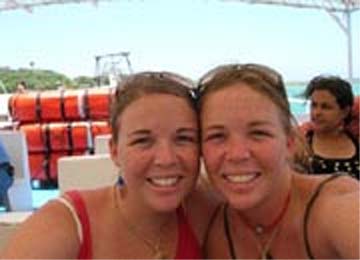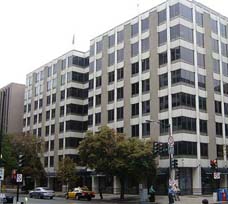2006.07.05: July 5, 2006: Headlines: COS - Honduras: COS - Nicaragua: Twins: Peace Corps: Twin Sisters Lauren and Connie Head follow in their Family’s Footsteps serving in the Peace Corps in Honduras and Nicaragua
Peace Corps Online:
Directory:
Nicaragua:
Peace Corps Nicaragua:
The Peace Corps in Nicaragua:
2006.07.05: July 5, 2006: Headlines: COS - Honduras: COS - Nicaragua: Twins: Peace Corps: Twin Sisters Lauren and Connie Head follow in their Family’s Footsteps serving in the Peace Corps in Honduras and Nicaragua
Twin Sisters Lauren and Connie Head follow in their Family’s Footsteps serving in the Peace Corps in Honduras and Nicaragua

Lauren is currently serving in Nicaragua, where she is teaching English to students aged five to 45 and helping to form a community bank that will ultimately fund a chicken co-op project in the village. Her sister Connie is working as a youth volunteer in Honduras, and recently returned from the first annual national youth baseball tournament where she coached a little league team from her village.
Twin Sisters Lauren and Connie Head follow in their Family’s Footsteps serving in the Peace Corps in Honduras and Nicaragua
Twin Sisters Follow Their Family’s Footsteps into the Peace Corps
In celebration of the 45th anniversary, this is the fourth in a series featuring Peace Corps legacy families.
WASHINGTON, D.C., July 5, 2006 – Growing up, twin sisters Lauren and Connie Head, 24, were constantly exposed to Peace Corps tales. Not only did their parents, Doug and Lyn Head, serve in the late 1960s, but their aunt, two uncles, and two cousins were volunteers as well.
“With our large Peace Corps family and numerous Peace Corps friends, we wanted to make sure that the girls did not feel any expectation to join the Peace Corps, but of course we were very proud of their decisions,” said Doug Head, the father of Lauren and Connie, both of whom followed in the family footsteps to the Peace Corps.
Lauren is currently serving in Nicaragua, where she is teaching English to students aged five to 45 and helping to form a community bank that will ultimately fund a chicken co-op project in the village. Her sister Connie is working as a youth volunteer in Honduras, and recently returned from the first annual national youth baseball tournament where she coached a little league team from her village.
Although Connie and Lauren’s parents do their best to avoid giving unsolicited advice, they both appreciate the wealth of understanding their family provides. “One major advantage we have in having a family with so many returned Peace Corps volunteers is that they understand why being a volunteer is so important and what motivates a person to leave their family and friends in the U.S. and take off to a developing country for two years,” wrote Connie from Honduras.
And like most legacy families, they can compare stories and experiences.
Doug and Lyn, who served in the 1960s, point to technology as the most dramatic change in the Peace Corps experience over the years. While Connie and Lauren are able to communicate with their family and each other about once a week via cell phone or e-mail, their parents remember using “snail-mail” as the only means of communication. “Each time we get an e-mail or talk with them on their cell phones, I marvel at the difference in accessibility volunteers have now,” said Lyn Head. “With instant communications, volunteers today can have one foot at home and one foot in their host country.”
Another major difference has been the training methods Peace Corps uses before sending volunteers to their site. While Doug trained in Fort Lupton, Colo., before heading to Afghanistan in 1967, Connie and Lauren both trained in-country, a method he feels is much more effective. “Our training was exceptionally paternalistic. It felt like Survivor Fort Lupton,” Doug said. “I think in-country training was a great learning opportunity for my daughters to live with host families, both for the language and the cultural immersion.”
Both parents have high hopes for their daughters’ Peace Corps experiences and the impact service will have on their lives. “I hope they will come to appreciate the unique experience of immersing themselves in the culture of their countries, that they will come to understand the privileges and relative wealth that we have as Americans and that they will return home with the desire to make their future community and the rest of the world a better place,” Doug said. His wife agreed. “I hope they will find ways to stand in solidarity with the people and cultures they’re coming to know through their Peace Corps service.”
Many other volunteers have supportive families at home, yet Connie said that it’s not the same, since their family members cannot always relate to the overall Peace Corps experience. Lauren agrees that the twins have a definite advantage by serving close together and having a family of returned volunteers at home: “It’s definitely nice to be able to talk to Connie, my parents, aunts or uncles, whether it’s to share frustrations, successes, or ask for advice and they really know what I’m talking about or how to advise me.”
Although Connie and Lauren were very busy during the first few months of service getting their projects off the ground, they were able to have a reunion in April when Connie visited Lauren in Honduras. Both twins were eagerly anticipating the visit, since it was the longest they had ever gone without seeing one another.
More than 5,000 Peace Corps volunteers have served in Honduras since the Peace Corps first entered the country in 1963 as one of its earliest ventures. Peace Corps’ program has helped achieve many positive results to combat poverty, including the expansion of the national education curriculum and creation of a national park system and water and sanitation systems. As the largest program in the Inter-America and Pacific region, volunteers work in the areas of child survival and health, business development, management of protected areas, water and sanitation, youth development, and municipal development. Today, there are 231 volunteers in the country. To learn more about Honduras, please visit the Where Do Volunteers Go? section.
Currently, there are 167 Peace Corps volunteers serving in Nicaragua. The Peace Corps began service in the Central American nation in 1968 and continued until 1979. In 1991, the program reopened with a special focus on developing new areas of service within Nicaragua in conjunction with the Ministry of Health and the Ministry of Education. To date, over 2,000 volunteers have served in Nicaragua. To learn more about Nicaragua, please visit the Where Do Volunteers Go? section.
When this story was posted in August 2006, this was on the front page of PCOL:





Peace Corps Online The Independent News Forum serving Returned Peace Corps Volunteers
 | The Peace Corps is "fashionable" again
The LA Times says that "the Peace Corps is booming again and "It's hard to know exactly what's behind the resurgence." PCOL Comment: Since the founding of the Peace Corps 45 years ago, Americans have answered Kennedy's call: "Ask not what your country can do for you--ask what you can do for your country. My fellow citizens of the world: ask not what America will do for you, but what together we can do for the freedom of man." Over 182,000 have served. Another 200,000 have applied and been unable to serve because of lack of Congressional funding. The Peace Corps has never gone out of fashion. It's Congress that hasn't been keeping pace. |
 | Changing the Face of Hunger
In his new book, Former Congressman Tony Hall (RPCV Thailand) says humanitarian aid is the most potent weapon the United States can deploy against terrorism. An evangelical Christian, he is a big believer in faith-based organizations in the fight against hunger. Members of Congress have recently recommended that Hall be appointed special envoy to Sudan to focus on ending the genocide in Darfur. |
 | PC will not return to East Timor in 2006
Volunteers serving in East Timor have safely left the country as a result of the recent civil unrest and government instability. Latest: The Peace Corps has informed us that at this time, the Peace Corps has no plans to re-enter the country in 2006. The Peace Corps recently sent a letter offering eligible volunteers the opportunity to reinstate their service in another country. |
 | Chris Dodd considers run for the White House
Senator Chris Dodd plans to spend the next six to eight months raising money and reaching out to Democrats around the country to gauge his viability as a candidate. Just how far Dodd can go depends largely on his ability to reach Democrats looking for an alternative to Hillary Clinton. PCOL Comment: Dodd served as a Volunteer in the Dominican Republic and has been one of the strongest supporters of the Peace Corps in Congress. |
 | Vasquez testifies before Senate Committee
Director Vasquez testifies before the Senate Foreign Relations Committee on his nomination as the new Representative to the United Nations Agencies for Food and Agriculture replacing Tony Hall. He has been the third longest serving Peace Corps Director after Loret Ruppe Miller and Sargent Shriver. PCOL Comment: Read our thanks to Director Vasquez for his service to the Peace Corps. |
 | Interview with a Hit Man
RPCV John Perkins says that for many years he was an "economic hit man" in the world of international finance whose primary job was to convince less developed countries to accept multibillion dollar loans for infrastructure projects that left the recipient countries wallowing in debt and highly vulnerable to outside political and commercial interests. In this exclusive interview for "Peace Corps Online," Colombia RPCV Joanne Roll, author of Remember with Honor, talks to Perkins about his Peace Corps service, his relation with the NSA, "colonization" in Ecuador, the consequences of his work, why he decided to speak out, and what his hopes are for change. |
 | Peace Corps stonewalls on FOIA request
The Ashland Daily Tidings reports that Peace Corps has blocked their request for information on the Volkart case. "After the Tidings requested information pertaining to why Volkart was denied the position — on March 2 — the newspaper received a letter from the Peace Corps FOIA officer stating the requested information was protected under an exemption of the act." The Dayton Daily News had similar problems with FOIA requests for their award winning series on Volunteer Safety and Security. |
 | PCOL readership increases 100%
Monthly readership on "Peace Corps Online" has increased in the past twelve months to 350,000 visitors - over eleven thousand every day - a 100% increase since this time last year. Thanks again, RPCVs and Friends of the Peace Corps, for making PCOL your source of information for the Peace Corps community. And thanks for supporting the Peace Corps Library and History of the Peace Corps. Stay tuned, the best is yet to come. |
 | History of the Peace Corps
PCOL is proud to announce that Phase One of the "History of the Peace Corps" is now available online. This installment includes over 5,000 pages of primary source documents from the archives of the Peace Corps including every issue of "Peace Corps News," "Peace Corps Times," "Peace Corps Volunteer," "Action Update," and every annual report of the Peace Corps to Congress since 1961. "Ask Not" is an ongoing project. Read how you can help. |
 | RPCV admits to abuse while in Peace Corps
Timothy Ronald Obert has pleaded guilty to sexually abusing a minor in Costa Rica while serving there as a Peace Corps volunteer. "The Peace Corps has a zero tolerance policy for misconduct that violates the law or standards of conduct established by the Peace Corps," said Peace Corps Director Gaddi H. Vasquez. Could inadequate screening have been partly to blame? Mr. Obert's resume, which he had submitted to the Peace Corps in support of his application to become a Peace Corps Volunteer, showed that he had repeatedly sought and obtained positions working with underprivileged children. Read what RPCVs have to say about this case. |
 | Why blurring the lines puts PCVs in danger
When the National Call to Service legislation was amended to include Peace Corps in December of 2002, this country had not yet invaded Iraq and was not in prolonged military engagement in the Middle East, as it is now. Read the story of how one volunteer spent three years in captivity from 1976 to 1980 as the hostage of a insurrection group in Colombia in Joanne Marie Roll's op-ed on why this legislation may put soldier/PCVs in the same kind of danger. Latest: Read the ongoing dialog on the subject. |
Read the stories and leave your comments.

Some postings on Peace Corps Online are provided to the individual members of this group without permission of the copyright owner for the non-profit purposes of criticism, comment, education, scholarship, and research under the "Fair Use" provisions of U.S. Government copyright laws and they may not be distributed further without permission of the copyright owner. Peace Corps Online does not vouch for the accuracy of the content of the postings, which is the sole responsibility of the copyright holder.
Story Source: Peace Corps
This story has been posted in the following forums: : Headlines; COS - Honduras; COS - Nicaragua; Twins
PCOL33521
19


























